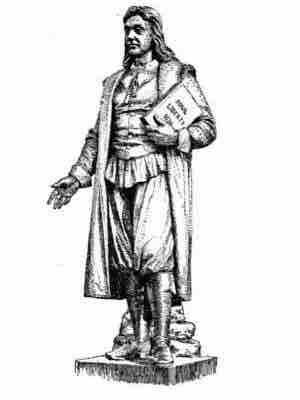Protestantism in Colonial America
The 18th century saw a host of social, religious, and intellectual changes across the British Empire. In the colonies, this could be seen in the evolution of Protestantism over the centuries.
The First Great Awakening
During the 18th century, the British Atlantic experienced an outburst of Protestant revivalism known as the First Great Awakening. (A Second Great Awakening would take place in the 1800s.) During the First Great Awakening, evangelists came from the ranks of several Protestant denominations: Congregationalists, Anglicans (members of the Church of England), and Presbyterians. They rejected what appeared to be sterile, formal modes of worship in favor of a vigorous emotional religiosity. Whereas Martin Luther and John Calvin had preached a doctrine of predestination and close reading of scripture, new evangelical ministers spread a message of personal and experiential faith that rose above mere book learning. Individuals could bring about their own salvation by accepting Christ, an especially welcome message for those who had felt excluded by traditional Protestantism—women, the young, and people at the lower end of the social spectrum.
The Great Awakening saw the rise of several Protestant denominations, including Methodists, Presbyterians, and Baptists (who emphasized adult baptism of converted Christians rather than infant baptism). These new churches gained converts and competed with older Protestant groups like Anglicans (members of the Church of England), Congregationalists (the heirs of Puritanism in America), and Quakers. The influence of these older Protestant groups, such as the New England Congregationalists, declined because of the Great Awakening. Nonetheless, the Great Awakening touched the lives of thousands on both sides of the Atlantic and provided a shared experience in the 18th-century British Empire.

Drawing of Roger Williams statue, by Franklin Simmons, 1903
Roger Williams, president of the Colony of Rhode Island, was a religious reformer and early Baptist.
Deism
Deism is a loosely used term that describes the views of certain English and continental thinkers. These views gained a small, unorganized, but influential number of adherents in America in the late 18th century. Deism stressed morality and rejected the orthodox Christian view of the divinity of Christ, often viewing him as a sublime, but entirely human, teacher of morality. Deism influenced the development of Unitarianism in America. By 1800, all but one Congregationalist church in Boston had Unitarian preachers teaching the strict unity of God, the subordinate nature of Christ, and salvation by character. Harvard University, founded by Congregationalists, became a source of Unitarian training.
Mennonites
The Mennonites are a religious group which immigrated to America from Europe. Some came in 1683 to settle in Pennsylvania. The Mennonites left Germany because they were persecuted for refusing to perform military service on the basis of religious objections. Later groups of Mennonites came to North America from Switzerland, Prussia, the Ukraine, and Russia. The Mennonites tended to be very conservative and had their own hymns and Psalters.
Methodism
Methodism spread to America in the late 1760s. Richard Boardman and Joseph Pilmore were both preachers appointed as missionaries by John Wesley. They traveled to the new world in 1769 to start American Methodist societies; Pilmore in Philadelphia, and Boardman in New York. Pilmore was more effective in spreading the cause in Philadelphia and even traveled into the south to preach and promote the society. Methodism spread along the east coast during the years leading up to the American Revolution.
Moravians
The Moravians, like John and Charles Wesley, arrived in America in 1735. The group left Moravia and Bohemia in response to harsh persecution for their religious beliefs and practices. The Moravians wished to serve as Christian missionaries for the different ethnic groups in America. They first settled in Georgia, then moved to Pennsylvania and North Carolina. The Moravians were deeply involved with the religious use of music. They practiced hymn singing daily, and some wrote instrumental music.